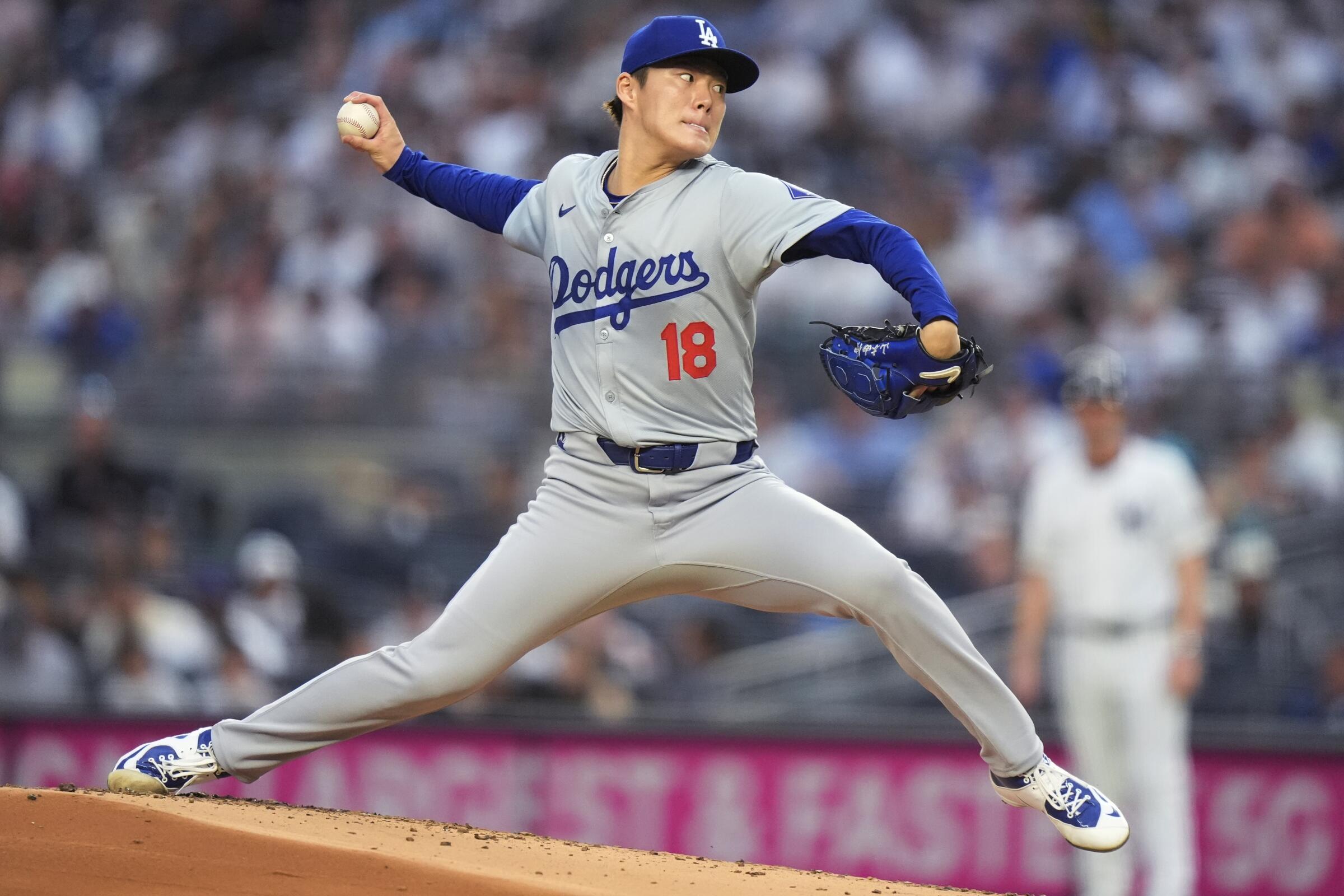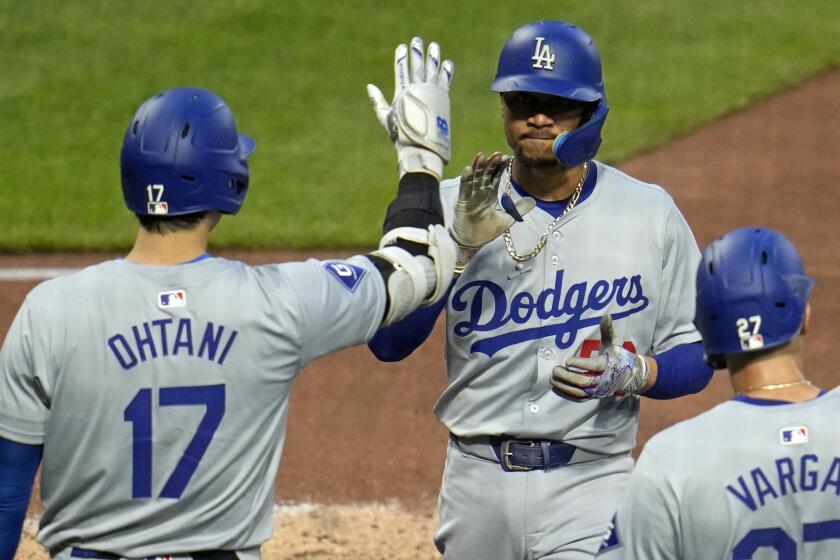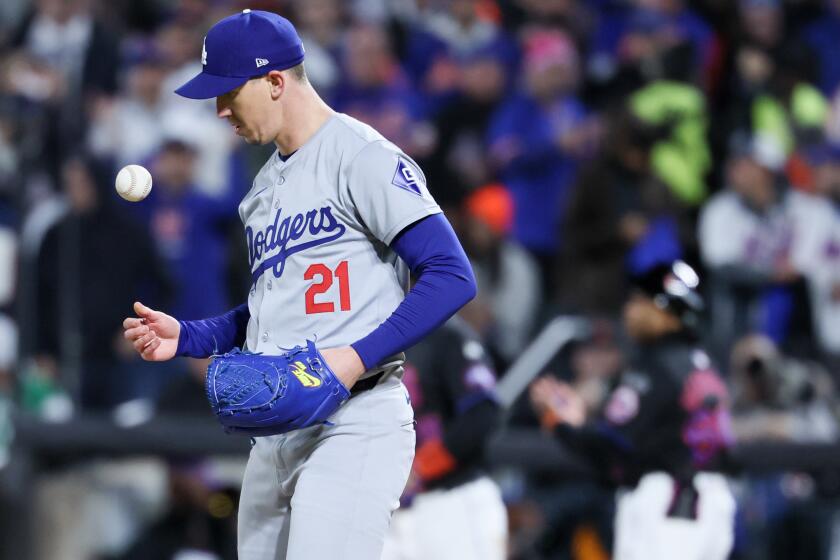Jack Harris covers the Dodgers for the Los Angeles Times. Before that, he covered the Angels, the Kings and almost everything else the L.A. sports scene had to offer. A Phoenix native, he originally interned at The Times before joining the staff in 2019.
1
NEW YORK — As the baseball world orbited around him Friday, Yoshinobu Yamamoto hardly seemed to care.
Not in the Dodgers’ clubhouse before the game, when Yamamoto sat alone at his locker, then with his legs propped up on a black leather couch, quietly reviewing scouting reports as reporters swarmed the otherwise empty room.
Not as he took the field hours later at Yankee Stadium for the opening game of this weekend’s highly anticipated Dodgers-Yankees series, receiving a chorus of boos from a fan base that had hoped to see him in pinstripes.
And certainly not over a scoreless seven-inning, seven-strikeout start in the Dodgers’ 2-1 win, with Yamamoto’s gem setting up Teoscar Hernández for a game-deciding two-run double in the 11th inning.
Mookie Betts hits a three-run home run as part of a sixth-run fifth inning as the Dodgers overcome errors and a rough relief stint by Evan Phillips to win.
“His best outing as a Dodger,” manager Dave Roberts said.
More than that, it was the perhaps the first time Yamamoto looked every bit of a superstar.
“I enjoyed the atmosphere,” Yamamoto said through his interpreter. “That was a great stadium. I enjoyed the whole game.”
In the buildup to this series in the Bronx — a showdown between not only two of MLB’s most historic franchises, but also two first-place teams that could meet in the World Series — most of the attention surrounded the former most valuable players and perennial All-Stars in the two lineups.
Shohei Ohtani, Mookie Betts and Freddie Freeman for the Dodgers. Aaron Judge, Giancarlo Stanton and Juan Soto for New York (although, Soto missed Friday’s game because a forearm injury and is questionable to play this weekend).
“I’m excited to see the stars show out,” Roberts said before the game. “We have some of the best players on the planet playing here.”

Where exactly Yamamoto fit into that celebrity constellation was less clear.
The 25-year-old Japanese star did earn the biggest contract for a pitcher outside of Ohtani in MLB history this offseason, signing with the Dodgers — despite heavy interest from other big-market clubs, the Yankees chief among them — on a 12-year, $325-million deal.
He came to MLB as one of the most decorated pitchers in the history of Japan’s Nippon Professional Baseball as well, winning that league’s equivalent of the Cy Young Award three times.
“The Yankees are a great team and I appreciate their interest in me during the negotiation,” Yamamoto said. “But when I face them, it’s just a normal game.”
Despite all that, Yamamoto entered Friday with few signature moments in his rookie season.
His earned-run average was 3.32, solid but outside the top 35 in the majors. He’d yet to face an offense anywhere near as potent as New York’s.
“It’s going to be a good test for him,” Roberts said before the game. “But I know, for sure, the moment, the stage won’t be too big.”
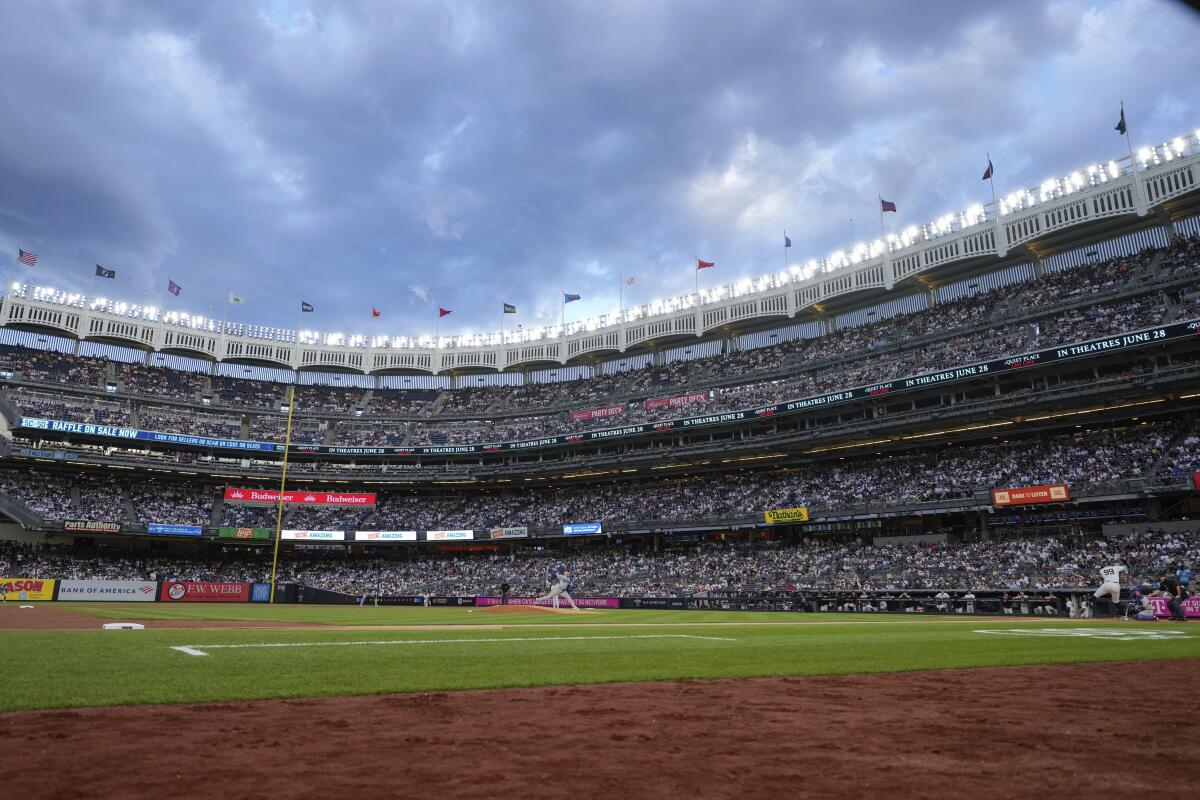
(Frank Franklin II / Associated Press)
Such intuition was spot-on.
Three hours before first pitch, as the rest of his teammates emptied out of a clubhouse teeming with more than two dozen reporters, Yamamoto stayed put. Hat backward. Headphones on. Seemingly in his own world, unfazed by the spotlight of what many billed as the biggest series so far this season.
“He’s pitched in a lot of big games in his career,” Roberts said, referring to Yamamoto’s Japanese career and World Baseball Classic championship with Japan last year. “This is just going to be another experience for him.”
Once he took the mound, however, Yamamoto didn’t pitch like it was just another game.
From the jump, the undersized 5-foot-11 right-hander found increased velocity in his fastball, throwing 29 pitches at 97 mph or harder (plus another six at 96.9). He’d eclipsed that mark only three times all season.
“I think that was just my mechanics working very well today,” Yamamoto said.
“Any time you have more velo,” catcher Will Smith added, “it helps.”
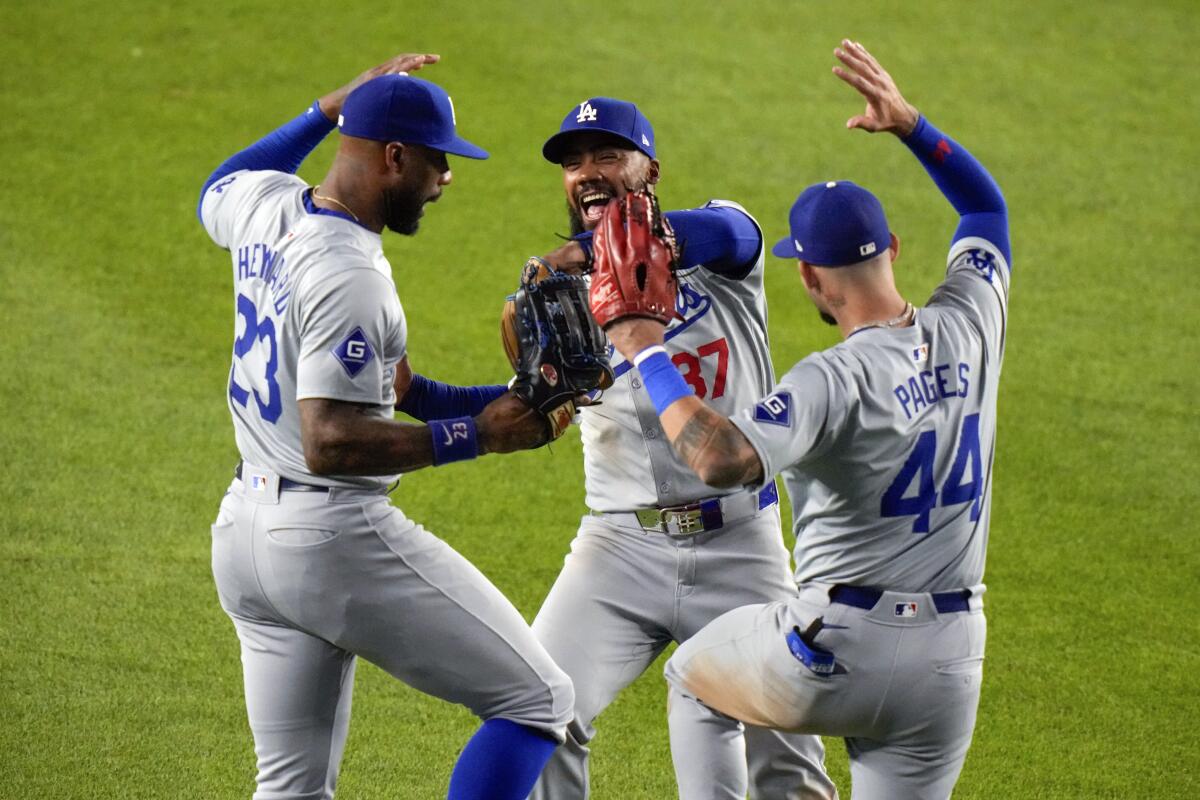
Dodgers teammates (from left) Jason Heyward, Teoscar Hernández and Andy Pages celebrate after a 2-1 win over the New York Yankees at Yankee Stadium on Friday.
(Frank Franklin II / Associated Press)
Yamamoto’s secondary stuff also looked sharper than normal, as he used the splitter and slider to complete four of his strikeouts.
“The things he did in Japan,” Hernández said, “he showed today,”
Asked later how he thought Friday might compare to a postseason atmosphere, Yamamoto shyly grinned.
“I didn’t think about October,” he said. “Just trying to execute my pitches like usual.”
Did Roberts learn anything about the pitcher, who has been tasked with anchoring the rotation alongside fellow offseason addition Tyler Glasnow?
“No,” Roberts said. “I knew he wasn’t gonna run from this moment.”
The Yankees — who entered the night with an eight-game winning streak and the best record in the majors — did stress Yamamoto early. Judge doubled in the first. Two runners reached in the second on a Kiké Hernández error and a Trent Grisham single.

But after escaping both of those jams — on a pair of wipeout sliders for inning-ending strikeouts — Yamamoto cruised the rest of the way.
He didn’t give up another hit. He retired 15 of the last 17 batters he faced. In the final two innings of his career-high 106-pitch outing, he worked around his only two walks as well, fanning Stanton with an elevated fastball to end the sixth before inducing a double-play grounder from DJ LeMahieu with his final pitch.
As he walked off the rubber for the last time, Yamamoto clenched his arms and let out a celebratory scream.
“I do think there’s a little bit of, it’s still Yankee Stadium,” Roberts said, unconvinced mechanics alone led to Yamamoto’s increased velocity. “I think that had something to do with the velo.”
The game remained scoreless long after Yamamoto left the mound.
The Yankees stranded the bases loaded in the eighth. Both teams failed to score their automatic extra-inning baserunner in the 10th. And not until Teoscar Hernández found the left-center-field gap in the 11th, scoring Ohtani (who went 0 for 5) from second base and Freeman (0 for 2 with two walks) from first, did either team manage to get a runner across the plate.
Major League Baseball’s emergency medical procedures now require that the antidote for opioid poisoning naloxone be made available at all ballparks.
“It’s the old adage of good pitching beats good hitting,” Roberts said. “You can run out as many good hitters as you can find.”
The Yankees got one run back in the bottom of the 11th, when Judge (two for three with two walks) lined an RBI single off Yohan Ramírez — a typically low-leverage reliever asked to save the game for the Dodgers’ worn-out bullpen.
The Yankees, however, mustered nothing else.
By then, Yamamoto had kept them quiet for too long. In a series all about star power, the Japanese pitcher made sure his name was atop the list.
